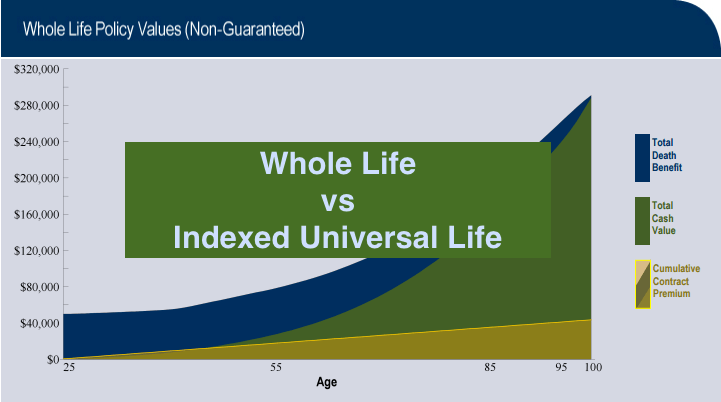All Categories
Featured
Table of Contents
1), often in an attempt to defeat their group standards. This is a straw guy disagreement, and one IUL individuals like to make. Do they contrast the IUL to something like the Lead Total Securities Market Fund Admiral Show no lots, an expense ratio (ER) of 5 basis points, a turnover proportion of 4.3%, and an exceptional tax-efficient record of distributions? No, they compare it to some terrible actively managed fund with an 8% load, a 2% EMERGENCY ROOM, an 80% turn over ratio, and a horrible record of temporary resources gain circulations.
Shared funds often make yearly taxable distributions to fund proprietors, also when the worth of their fund has decreased in value. Mutual funds not only require income reporting (and the resulting annual tax) when the shared fund is increasing in worth, but can likewise enforce earnings tax obligations in a year when the fund has gone down in worth.
That's not exactly how mutual funds function. You can tax-manage the fund, gathering losses and gains in order to minimize taxable distributions to the financiers, however that isn't somehow mosting likely to transform the reported return of the fund. Just Bernie Madoff kinds can do that. IULs prevent myriad tax obligation traps. The possession of mutual funds may require the common fund owner to pay estimated taxes.

IULs are simple to position to make sure that, at the owner's death, the beneficiary is exempt to either income or estate taxes. The very same tax obligation decrease methods do not work almost also with common funds. There are many, commonly expensive, tax obligation traps connected with the timed trading of shared fund shares, catches that do not relate to indexed life insurance policy.
Chances aren't really high that you're mosting likely to undergo the AMT as a result of your common fund distributions if you aren't without them. The remainder of this one is half-truths at ideal. As an example, while it is real that there is no earnings tax obligation as a result of your beneficiaries when they acquire the earnings of your IUL policy, it is additionally true that there is no earnings tax obligation as a result of your successors when they inherit a shared fund in a taxed account from you.
Universal Life Insurance Tax Benefits
There are far better methods to prevent estate tax concerns than getting financial investments with low returns. Shared funds might create revenue taxation of Social Protection benefits.
The growth within the IUL is tax-deferred and might be taken as free of tax revenue using lendings. The plan proprietor (vs. the shared fund manager) is in control of his/her reportable income, hence allowing them to minimize or also remove the taxes of their Social Safety and security advantages. This one is terrific.
Right here's one more minimal problem. It holds true if you purchase a common fund for claim $10 per share prior to the distribution day, and it disperses a $0.50 distribution, you are after that mosting likely to owe taxes (most likely 7-10 cents per share) although that you have not yet had any kind of gains.
In the end, it's truly regarding the after-tax return, not exactly how much you pay in tax obligations. You are going to pay more in tax obligations by utilizing a taxable account than if you purchase life insurance policy. But you're additionally possibly going to have more money after paying those taxes. The record-keeping demands for possessing common funds are considerably more intricate.
With an IUL, one's records are maintained by the insurance provider, duplicates of yearly declarations are sent by mail to the proprietor, and circulations (if any) are completed and reported at year end. This one is likewise kind of silly. Obviously you must keep your tax obligation documents in case of an audit.
Guaranteed Universal Life Quotes
Hardly a factor to acquire life insurance policy. Mutual funds are typically component of a decedent's probated estate.
In addition, they are subject to the delays and expenditures of probate. The profits of the IUL plan, on the various other hand, is constantly a non-probate circulation that passes outside of probate straight to one's named recipients, and is therefore exempt to one's posthumous lenders, undesirable public disclosure, or similar delays and prices.
We covered this one under # 7, but simply to summarize, if you have a taxable mutual fund account, you have to place it in a revocable trust fund (and even simpler, use the Transfer on Death designation) to avoid probate. Medicaid disqualification and lifetime revenue. An IUL can supply their owners with a stream of earnings for their whole lifetime, no matter the length of time they live.
This is advantageous when arranging one's affairs, and converting properties to income prior to a nursing home arrest. Mutual funds can not be transformed in a comparable fashion, and are often considered countable Medicaid properties. This is another dumb one promoting that inadequate individuals (you understand, the ones who need Medicaid, a federal government program for the poor, to pay for their nursing home) should utilize IUL instead of common funds.
Buy Iul
And life insurance policy looks dreadful when contrasted fairly versus a pension. Second, people who have cash to get IUL above and past their retired life accounts are going to have to be awful at managing money in order to ever before qualify for Medicaid to spend for their retirement home prices.
Chronic and incurable illness rider. All policies will certainly permit an owner's very easy accessibility to cash money from their policy, usually waiving any kind of abandonment fines when such people suffer a severe health problem, require at-home care, or end up being confined to an assisted living home. Common funds do not supply a similar waiver when contingent deferred sales fees still use to a common fund account whose owner requires to sell some shares to fund the costs of such a stay.
Adjustable Life Insurance Policy
You get to pay more for that advantage (motorcyclist) with an insurance coverage policy. Indexed universal life insurance policy provides fatality benefits to the recipients of the IUL owners, and neither the owner neither the beneficiary can ever before shed money due to a down market.
Currently, ask yourself, do you actually need or want a survivor benefit? I certainly do not require one after I reach economic freedom. Do I desire one? I suppose if it were inexpensive sufficient. Obviously, it isn't cheap. Usually, a buyer of life insurance spends for real expense of the life insurance policy advantage, plus the expenses of the policy, plus the profits of the insurance provider.
Universal Insurance Usa
I'm not totally certain why Mr. Morais threw in the whole "you can't shed money" again right here as it was covered fairly well in # 1. He just wished to repeat the ideal selling factor for these things I intend. Again, you do not lose small dollars, but you can shed genuine dollars, as well as face major opportunity price because of low returns.

An indexed global life insurance coverage plan proprietor might exchange their plan for a totally different plan without setting off income tax obligations. A mutual fund proprietor can stagnate funds from one common fund company to one more without offering his shares at the former (thus setting off a taxable event), and repurchasing brand-new shares at the latter, often subject to sales costs at both.
While it holds true that you can trade one insurance plan for another, the factor that people do this is that the very first one is such a horrible plan that even after acquiring a brand-new one and undergoing the early, unfavorable return years, you'll still come out ahead. If they were sold the best plan the very first time, they should not have any kind of need to ever before trade it and undergo the very early, unfavorable return years once more.
Latest Posts
Index Life Insurance Companies
North American Universal Life Insurance
What Is Guaranteed Universal Life Insurance